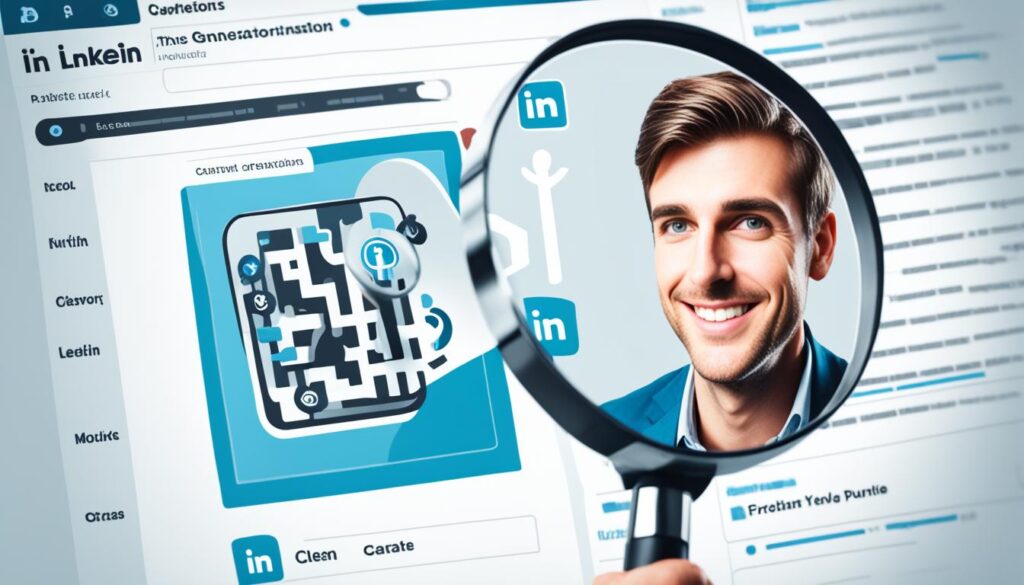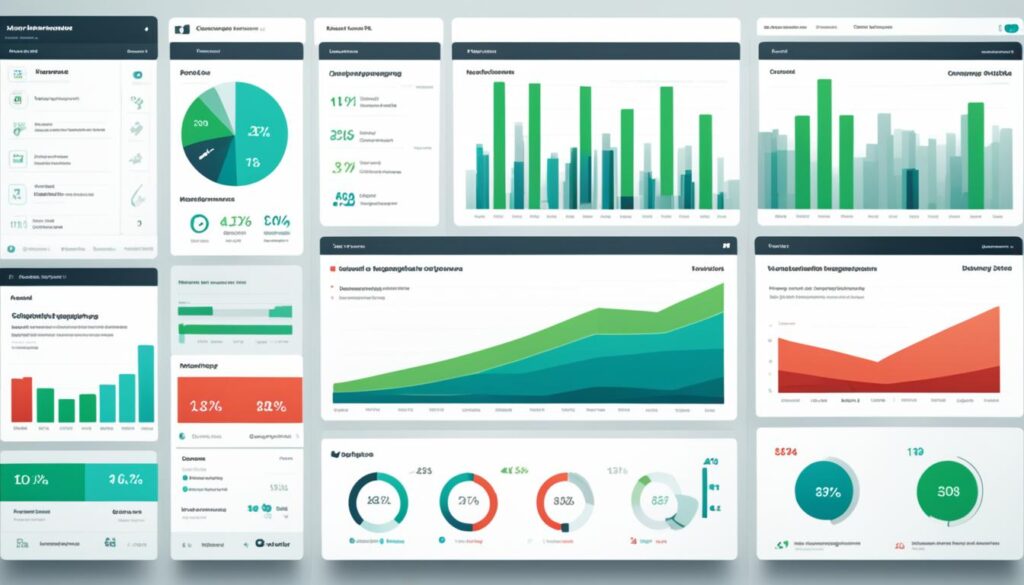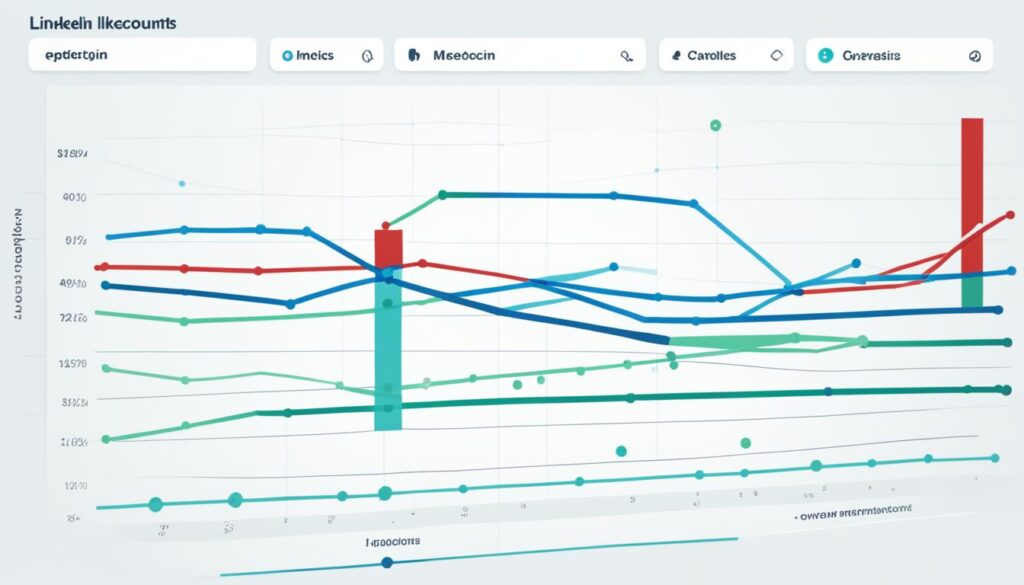“The future belongs to those who see possibilities before they become obvious.” – Theodore Levitt
Today, keeping up in sales is tough. You need leads fast. Using LinkedIn by hand is slow. You spend hours on messages, finding the right people, and follow-ups. But with automation tools, this changes.
These tools let you kick-start on LinkedIn without all the manual work. This way, you have more time to make real connections and close deals. Adding automation to your sales plan brings big bonuses. You save time, get more leads, better turn those leads into sales, and avoid getting too tired. Plus, it makes you more productive overall.
Key Takeaways
- LinkedIn automation tools can streamline lead generation by automating repetitive tasks like sending connection requests and follow-up messages.
- Leveraging LinkedIn automation can help you save time, increase lead volume, and improve conversion rates.
- Automation frees up time for sales professionals to focus on strategic activities like research, proposal crafting, and closing deals.
- Defining an ideal customer profile and implementing lead scoring are crucial for effective LinkedIn automation campaigns.
- Compliance with LinkedIn’s terms of service and personalized messaging are key best practices for successful LinkedIn automation.
Introduction
Today, LinkedIn is a key player in finding leads, LinkedIn lead generation, looking for potential business leads, and for b2b prospecting. Over 1 billion people use LinkedIn. It’s where professionals and companies go to make connections, create relationships, and grow.
Importance of LinkedIn for Lead Generation
Getting leads the traditional way on LinkedIn is slow. You have to search for leads, write messages, and keep track of them. But, with LinkedIn automation, this changes. It speeds up how you find leads and help to grow your business. Automation helps you find your target audience and connect with them better.
Overview of the Guide
This guide will show you step by step how to use LinkedIn automation for your lead generation. You will learn to make your LinkedIn profile better, find your target market, pick the best automation tools, start automatic lead generation, and connect LinkedIn with your CRM for easy lead handling. At the end, you’ll know how to boost your LinkedIn lead generation and grow your business.
“Automating your LinkedIn lead generation can lead to increased team productivity and more time engaging with qualified prospects.”
Step 1: Optimize Your LinkedIn Profile
Your LinkedIn profile is like your online store. It’s key to make it inviting for potential leads. First off, pick a profile picture that shows you as a pro. A great image of yourself can really catch people’s eyes and set you apart from others.
Crafting a Professional Profile Picture
Choose a picture that’s clear and shows your best side. Don’t use blurry images, group shots, or strange backgrounds. These can take away from the image you want to show people about yourself. Remember, an impressive profile picture is a big step towards earning people’s trust.
Writing a Compelling Headline and Summary
Create a headline that stands out and tells people what you’re about. Keep it brief but packed with info on what you do best. Your summary is where you can go deeper into your work and what you’ve achieved. It’s a great chance to show your smarts and let others see you as an expert.
Highlighting Skills and Experiences
Show off what you’re good at and what you’ve done on your profile. Highlighting your skills and experiences helps others see what you can do for them. You might want to add cool stuff like videos or slides to grab extra attention. This can make your profile stick in people’s minds.
Adding Recommendations and Endorsements
Get others to say good things about you on your profile. This can really help you earn trust and look more credible. Aim to get recommendations from people who know your work well. It can boost how others see you online.
By making your LinkedIn profile top-notch, you show you’re a valuable contact. This can help kick-start more business opportunities for you.

Step 2: Identify Your Target Audience
First, know who your target audience is before automating LinkedIn outreach. Use LinkedIn’s search features to find them by industry, job title, and location. Create an ideal customer profile (ICP) to understand clients’ needs and traits better.
Segment your audience to match your automated campaigns to their needs. This makes the message more personal and effective.
Using LinkedIn’s Search Features
LinkedIn lets you search with great detail. You can choose your audience by:
- Industry
- Job title
- Company size
- Location
- Keywords
- Connections
Defining Your Ideal Customer Profile
Make a thorough ideal customer profile (ICP) for successful B2B lead generation. Think about demographics, firmographics, behaviors, and needs.
- Demographic information (age, gender, location)
- Firmographic data (industry, company size, job title)
- Behavioral patterns (pain points, purchasing behaviors, decision-making process)
- Psychographic traits (values, interests, preferences)
Segmenting Your Audience for Targeted Outreach
After picking your target audience and making a detailed ICP, segment them. Choose by industry, company size, job function, and more. This enables highly personal prospecting.
Tailor your messages for these specific groups to better your LinkedIn lead generation work. This improves how well their needs are met.
Step 3: Choose the Right Automation Tools
LinkedIn automation has many tools to help with lead generation. Options range from LinkedIn Sales Navigator to CoPilot AI and Taplio. It’s vital to choose tools that meet your lead gen goals.
Overview of Top LinkedIn Automation Tools
LinkedIn Sales Navigator lets you find and connect with your audience efficiently. Its search and messaging features help you stand out. CoPilot AI and Taplio use AI to prompt personal and scalable outreach.
Key Features to Look For
- Personalized messaging and automated follow-ups
- Advanced targeting and segmentation options
- Robust analytics and performance tracking capabilities
- Seamless integration with your existing CRM and marketing tools
- Compliance with LinkedIn’s terms of service to maintain platform integrity
Comparing Popular Tools
| Tool | Key Features | Pricing |
|---|---|---|
| LinkedIn Sales Navigator |
|
$79.99/month (Individual) – $129.99/month (Team) |
| CoPilot AI |
|
Custom pricing based on usage and features |
| Taplio |
|
$29/month (Basic) – $99/month (Pro) |
Pick LinkedIn automation tools that fit your objectives well. Think about compliance, usability, and if they support your marketing and sales needs.

Step 4: Set Up Automated Lead Generation Campaigns
Using the right tools, you can boost your sales funnel. It’s all about sending personalized connection requests. These show your real interest in each person. Make sure you address their needs. Automation also lets you follow up with these leads. This helps guide them towards making a purchase.
Crafting Personalized Connection Requests
First impressions are key on LinkedIn. Use automation to tailor messages to each person. Empathize with their struggles and show how you can help. Remember, avoid sending general messages. Make each one specific and genuine.
Automating Follow-Up Messages
Keeping in touch is important for building relationships. Automation can send personalized follow-ups. This is key for staying in your prospect’s mind. You might share helpful insights, offer resources, or check how they’re doing.
Using Drip Campaigns to Nurture Leads
Drip campaigns deliver messages over time. They are great for building relationships. Create a series of emails or messages with helpful content. This keeps prospects moving toward a sale. Automation makes this easy, with no extra work from your team.
https://www.youtube.com/watch?v=MdJS93_tjGQ
“Automation helps scale lead generation efforts, reaching a wider audience without compromising quality.”
LinkedIn automation can make your lead gen efforts smoother. It helps you reach out, build relationships, and improve your sales funnel. Always tweak and check your strategies for the best results.
Step 5: Monitor and Optimize Your Campaigns
Watching and improving are key to making your LinkedIn automation campaigns work. You should keep an eye on important numbers and adjust your plans with what you learn. This way, you will make your LinkedIn lead generation better and get more results.
Tracking Key Metrics and KPIs
To see how well your LinkedIn lead generation is doing, you need to watch numbers like:
- Connection request acceptance rates
- Message response rates
- Lead-to-customer conversion rates
- Cost per lead
- Lead quality
- Lead velocity
- Lead source
Analyzing Campaign Performance Data
Looking at the data from your LinkedIn campaigns tells you a lot. You can spot trends and make smart, data-driven choices. This will help you improve your generation of leads and get better outcomes.
Adjusting Strategies Based on Insights
Change your game plan depending on what the data shows. This is how you keep getting better results from your LinkedIn lead generation work. You might change who you’re targeting, what you’re saying, or where you’re putting your budget to focus on what works best.
| Metric | Benchmark | Your Performance |
|---|---|---|
| Connection Request Acceptance Rate | 25-40% | 35% |
| Message Response Rate | 15-25% | 20% |
| Lead-to-Customer Conversion Rate | 5-10% | 8% |
| Cost per Lead | $10-$50 | $25 |
Keep a close watch on your LinkedIn campaigns and adjust as needed with your data. This will make your lead generation efforts better and lead to steady growth in sales.

Step 6: Integrate LinkedIn with Your CRM System
Making your LinkedIn efforts work best means connecting your CRM system with your lead activities. This link between powerful tools helps manage and follow up on leads easily. This leads to more sales and money for your business.
Benefits of CRM Integration
Linking your CRM with LinkedIn brings key benefits. It can change how you find leads and make sales. Here are some top pluses:
- Automated lead capture: Easily put new LinkedIn leads into your CRM. Say goodbye to manual work.
- Lead segmentation: Use LinkedIn data to group leads by what they like and where they are in the sales process.
- Streamlined handoff to sales: Make it easy for the marketing and sales teams to work together. This stops leads from slipping away.
- Personalized outreach: See LinkedIn profiles in your CRM to tailor messages better, making them more effective.
- Comprehensive reporting: Dig into the data to see how well your LinkedIn efforts are working across your CRM and LinkedIn.
Setting Up CRM Integration for LinkedIn Leads
Getting your CRM and LinkedIn to work together is simple. However, a good setup is key to reaping the benefits. Salesforce, Salesflare, HubSpot, and Zoho CRM are good choices. Setting up involves allowing access, matching data, and setting rules to move new leads and info smoothly.
Automating Lead Management and Follow-Up
With your CRM and LinkedIn working together, automation can do wonders. For instance, new leads can be entered into your CRM automatically when they connect with you on LinkedIn. You can also send automated emails or InMails to keep in touch with leads, making for a smoother sales process.
Mixing your CRM with LinkedIn lets you do a lot more. It helps in finding, managing, and turning leads into sales faster. This smart mix could really change the game for your business, increasing sales efficiency and, finally, your revenue.

Step 7: Leverage LinkedIn Analytics for Continuous Improvement
To boost your LinkedIn lead generation, it’s key to use the analytics tools. They give you insights that help make smarter choices for success.
Utilizing LinkedIn Analytics Tools
LinkedIn’s analytics tools are great for getting lots of useful data. They show things like connection rates and what messages are working. This helps you see the full picture of how well your campaign is doing.
You can zoom into details, finding trends and actions to take next.
Identifying Trends and Patterns
Using LinkedIn Analytics, you can spot new trends in getting leads. For example, what kinds of connections get more accepts? What messages get a better response? By knowing this, you can improve your approach and focus where it matters most.
Making Data-Driven Decisions for Better Results
With LinkedIn Analytics’ help, you can make changes that really work. You might see a job title that’s very interested in what you offer. Or certain ads that do better than the rest.
By always adjusting based on real data, your results will improve. This can really elevate your B2B sales.

“The more you know about your customers, the better you can serve them. LinkedIn Analytics provides the insights I need to truly understand my target audience and refine my lead generation optimization strategies.”
– [Maree Stuart, Marketing Strategist]
| Metric | Benchmark | Your Performance |
|---|---|---|
| Connection Acceptance Rate | 35-45% | 42% |
| Message Engagement Rate | 20-30% | 24% |
| Lead Conversion Rate | 10-15% | 13% |
Keep an eye on your LinkedIn analytics. Adjusting your strategies with real data will let LinkedIn boost your data-driven marketing.
Conclusion
In this guide, you’ve learned how to use LinkedIn automation for better lead generation. By making your LinkedIn profile better, finding your audience, picking the right tools, starting targeted efforts, and linking with your CRM, you can use LinkedIn fully for leads.
Recap of Key Steps
Keep an eye on your campaigns and use LinkedIn’s data to improve. Also, know the best tips to do better. Follow these actions, and you’ll see your sales increase and your company grow.
Encouragement to Implement LinkedIn Automation
LinkedIn automation helps you save time and reach more people. This way, you improve your leads and grow your business steadily.
Final Tips for Maximizing Lead Generation Success
Use LinkedIn automation smartly. Too much can make your messages seem cold and cause problems. Keep your messages personal and follow LinkedIn’s rules. This way, you make the most of LinkedIn and move your business ahead.
FAQ About LinkedIn Automation For Lead Generation
What are the key benefits of using LinkedIn automation for lead generation?
LinkedIn automation saves time and boosts lead volume. It also helps improve your conversion rates. Plus, it reduces burnout and makes you more productive.
How can I optimize my LinkedIn profile to attract potential leads?
To make your profile stand out, use a professional picture. Write an interesting headline and summary. Show off your best skills and experiences. Also, ask your connections for recommendations.
How do I define my target audience on LinkedIn?
Define your target audience by using LinkedIn’s search tools. Look for leads by industry, job, and location.Don’t forget to create an ideal customer profile. This will help you reach the right people.
What are some of the top LinkedIn automation tools available?
Top tools include LinkedIn Sales Navigator, CoPilot AI, and Taplio. These tools offer personal messaging and advanced targeting. They also have great analytics and reporting features.
How can I set up effective LinkedIn lead generation campaigns using automation?
Create personalized connection requests. Automate your follow-up messages. Use drip campaigns to send several personal messages. This will help nurture your leads effectively.
Why is it important to continuously monitor and optimize my LinkedIn automation campaigns?
It’s key to keep an eye on your LinkedIn automation. By tracking your campaign’s success, you can make improvements. This leads to better results in your lead generation.
How can integrating LinkedIn with my CRM system benefit my lead generation efforts?
Linking LinkedIn and your CRM can improve how you capture leads. It sorts leads by their actions and helps with moving them from marketing to sales. This makes the lead management process more efficient.
How can I leverage LinkedIn’s analytics tools to further optimize my lead generation campaigns?
LinkedIn’s analytics tools offer insights to fine-tune your lead generation. Track key metrics and spot trends. This data will help you make smarter moves to enhance your LinkedIn activities.
Source Links
- Streamline Your Sales Funnel: How LinkedIn Automation Tools Boost Lead Capture (Without Sacrificing Quality)
- Mastering LinkedIn Automation for Lead Generation
- LinkedIn Automation Tool for Lead Generation | Meet Alfred
- 10 Best Practices to put your LinkedIn lead generation on autopilot
- 🚀Top 26 LinkedIn Automation Tools for Lead Generation in 2024 – Expandi
- Put Your Lead Gen on Autopilot: Lead Generation Automation
- 4 Simple Steps To Generate More Leads On Linkedin In 2024 – Expandi
- 5 LinkedIn Profile Tips To Optimize For Lead Generation
- Unleash the Power of LinkedIn: A Step-by-Step Guide to Finding Leads
- Step-by-Step Guide to a Successful Lead Generation Strategy
- The Ultimate 5-Step Guide to Unstoppable Lead Generation on LinkedIn.
- A Closer Look at LinkedIn Lead Generation Automation
- 12 Best Tools for Automated Lead Generation [2024]
- LinkedIn Automation Done Right: Strategies for Lead Generation
- Transform Lead Generation in 3 Steps with AI Automation Tools
- How to Automate Lead Generation
- How To Automate Lead Generation [Step-By-Step Guide] | Skylead
- How can you automate your lead generation?
- Monitor Your Lead-Gen Campaigns for Success in 5 Steps
- LinkedIn Lead Generation: Tactics for Generating Target Leads through LinkedIn
- How to Create, Manage, and Optimize LinkedIn Lead Generation Ads for Your Manufacturing Business
- How to integrate CRM and LinkedIn?
- What do you do if your lead generation efforts are not effectively integrated with your CRM system?
- Here’s how you can seamlessly integrate CRM systems with lead generation technology.
- LinkedIn Lead Generation Strategies for 2024
- The 7 Best LinkedIn Lead Generation Tools for 2024
- Mastering LinkedIn: Proven Strategies to Generate Leads on LinkedIn in 2024
- The Truth About LinkedIn Lead Generation: What Works and What Doesn’t
- Lead generation automation on LinkedIn: Opportunities and risks
- Automated LinkedIn Lead Generation: Clever or Annoying? | Blog
